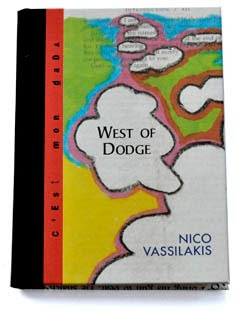Nico Vassilakis has been a cornerstone of the Seattle visual and concrete poetry scene for many years. He is a founding member of the “Subtext Collective” and was co-curator of the recently retired Subtext Reading Series, which for 15 years exposed Seattle to a plethora of new writing from across the country.
His latest book, West of Dodge has recently been published by Ireland’s Redfoxpress, a press dedicated “to experimental, concrete and visual poetry, or any work combining text and visual arts in the spirit of dada or fluxus.” It is the latest work in their series C’est mon dada.
The book takes Louis L’Amour’s story West of Dodge as its jumping off point. We asked Vassilakis a couple of question related to the project.
Book Patrol: How did you get to L’Amour. Have you read him? A fan? or is it more the L’Amour mystique?
Vassilakis: None of these really. My attention to L’Amour has always been askance – reading his name on bookshelves in hotel rooms while crossing the country. Running my fingers over his spine browsing shelves at thrift stores. Etc. How I wound up with West of Dodge is the result of an invitation to participate in an altered book project. The poet, Dan Waber, contacted me 5 years ago with his idea of a collaborative project (http://www.logolalia.com/alteredbooks/). I agreed. It just so happened that I was assigned this particular book. Every few months we would mail each other treated pages of the book. Dan altered one side of the page and I altered the other. My tools were a black China Marker, 4 colors of highlighting markers, a variety of cut-out text – even hair.

BP: What about the altered book format attracts you? NV: The physical process of reading has to do with the act of staring. You read a page by moving across it in blocks of staring called saccades. A saccade is a small rapid jerky movement of the eye especially as it jumps from fixation on one point to another (as in reading.) There are times while reading that you land on a word, or even a letter and it can arouse a response to something other than the content of what’s being read. That is where I would begin to alter the book. Finding those parts or points that attract deviation. It might have something to do with appropriating text. Extracting information from one given text to produce another. By altering the page you bring about new meaning. Also the visual embellishment used to enhance this procedure adds another aspect to the treatment. It creates another possibility.
My earliest and most obvious connection to the altered book was coming across Tom Phillips‘ Humument. It had less to do with craft and more with art. This, along with some other books, bolstered my fascination with the alphabet, with text, with the letter itself as material for the sort of visual literature I was interested in. I don’t know enough to comment on the history of altered books, but I’d like to think of one path coming from dada, fluxus and early concrete poetry.
I do not consider my version of West of Dodge to be product of erasure. It was not about elimination, but discovery. Finding a way to move forward with the distraction of staring at text in place. Each page was done in one tumultuous sitting.
************************** Here’s Nico at a recent reading at Seattle’s Pilot Books




